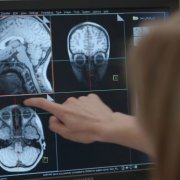"Children as young as 3 have brain network devoted to interpreting thoughts of other people.
by Anne Trafton
Humans use an ability known as theory of mind every time they make inferences about someone else’s mental state — what the other person believes, what they want, or why they are feeling happy, angry, or scared.
Behavioral studies have suggested that children begin succeeding at a key measure of this ability, known as the false-belief task, around age 4. However, a new study from MIT has found that the brain network that controls theory of mind has already formed in children as young as 3.
The MIT study is the first to use functional magnetic resonance imaging (fMRI) to scan the brains of children as young as age 3 as they perform a task requiring theory of mind — in this case, watching a short animated movie involving social interactions between two characters.
“The brain regions involved in theory-of-mind reasoning are behaving like a cohesive network, with similar responses to the movie, by age 3, which is before kids tend to pass explicit false-belief tasks,” says Hilary Richardson, an MIT graduate student and the lead author of the study.
Rebecca Saxe, an MIT professor of brain and cognitive sciences and an associate member of MIT’s McGovern Institute for Brain Research, is the senior author of the paper, which appears in the March 12 issue of Nature Communications. Other authors are Indiana University graduate student Grace Lisandrelli and Wellesley College undergraduate Alexa Riobueno-Naylor..."
Read the full story on the McGovern Institute website using the link below.

